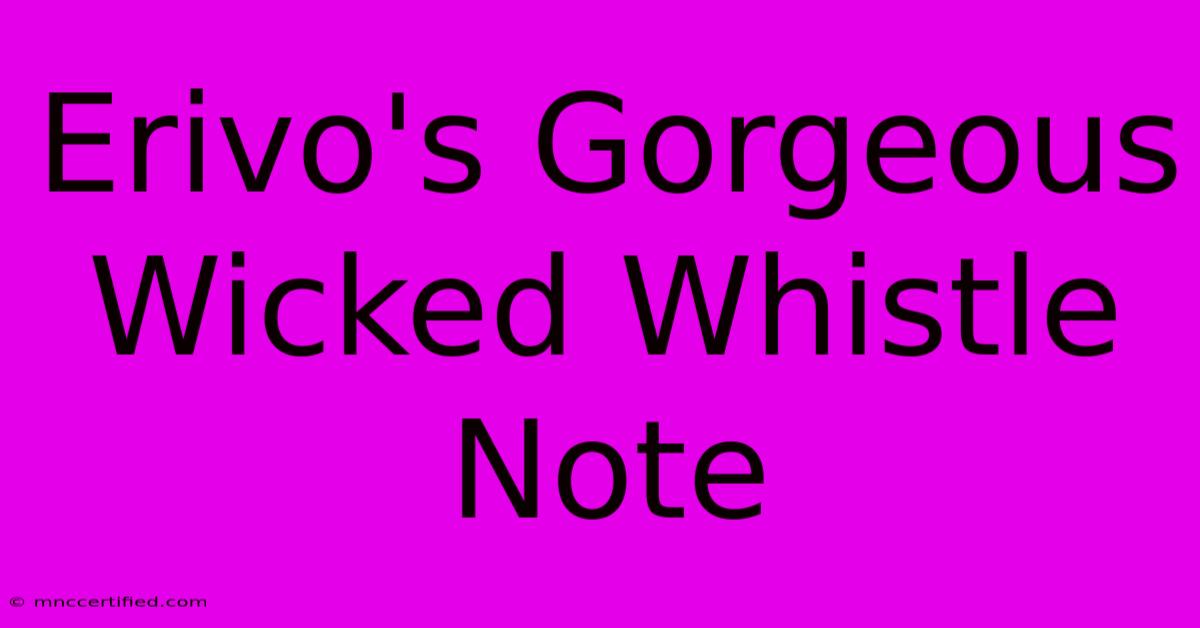Erivo's Gorgeous Wicked Whistle Note

Table of Contents
Erivo's Gorgeous Wicked Whistle Note: A Vocal Masterclass
Cynthia Erivo's performance as Elphaba in the 2020 film adaptation of Wicked has been lauded for many reasons, but one element stands out: her breathtaking whistle tone. This high-pitched, almost ethereal vocal technique is not only incredibly difficult to master but also adds a layer of unique magic to her portrayal of the misunderstood green witch. This article delves into the technical aspects of Erivo's whistle note, its impact on her performance, and its significance in the broader context of musical theatre.
The Technical Prowess of a Whistle Note
A whistle tone, in singing, is produced by focusing the breath and vocal cords in a specific way to create a sound reminiscent of a whistle. It's far more than just a high note; it's a highly specialized technique requiring exceptional vocal control, breath support, and precision. Erivo's mastery is evident in the effortless quality of her whistle note in Wicked. It's not strained or forced; it sounds natural and powerful, integrated seamlessly into her overall vocal performance.
Beyond the High Note: Breath Control and Resonance
The beauty of Erivo's whistle note isn't solely about hitting the high note itself. It's the impeccable breath control that sustains it. This is a testament to years of rigorous vocal training and discipline. The resonance she achieves is also key; the sound isn't thin or reedy; it carries a rich, full quality that fills the theater (or in this case, the screen). This level of resonance suggests a deep understanding of vocal anatomy and technique.
The Emotional Impact of the Whistle Note in Wicked
Erivo's whistle note isn't just a technical marvel; it's emotionally resonant. It perfectly captures the vulnerability and power of Elphaba, amplifying the emotional intensity of specific scenes. The whistle note becomes a sonic representation of Elphaba's otherworldly essence, her capacity for both immense sorrow and incredible strength. It underscores her defiance, her pain, and her unwavering spirit.
Enhancing Character Development
The strategic placement of the whistle note in the film's score enhances Elphaba's character development. It's not overused; its judicious use highlights pivotal moments, thereby amplifying their emotional impact on the audience. This careful deployment of a technically challenging vocal maneuver demonstrates not only vocal skill but also a deep understanding of storytelling and character arc.
Erivo's Legacy: Inspiring a New Generation of Singers
Erivo's masterful execution of the whistle note in Wicked has inspired countless aspiring singers. Her performance serves as a powerful example of what dedication and technical skill can achieve. It challenges the perception of what is possible in musical theatre, demonstrating that technical virtuosity can be both breathtaking and emotionally moving.
The Importance of Vocal Training and Perseverance
Erivo's achievement underscores the importance of rigorous vocal training and unwavering perseverance. Mastering techniques like the whistle note requires years of dedicated practice and the guidance of experienced vocal coaches. Her success serves as an inspiration to aspiring vocalists to continue pushing their boundaries and refining their craft.
Conclusion: A Noteworthy Achievement
Cynthia Erivo's whistle note in Wicked is more than just a high note; it's a testament to exceptional vocal talent, technical mastery, and artistic expression. It's a defining element of her performance, enhancing Elphaba's character and leaving an indelible mark on the musical theatre landscape. Her achievement inspires not only awe but also a deeper appreciation for the artistry and dedication required to achieve such vocal excellence. This performance will undoubtedly be studied and emulated by aspiring singers for years to come, solidifying its place as a landmark moment in musical theatre history.
Keywords: Cynthia Erivo, Wicked, whistle note, vocal technique, musical theatre, singing, high note, breath control, resonance, vocal training, performance, Elphaba, film adaptation, vocal mastery, breath support, emotional impact, character development, singing technique, vocal power.

Thank you for visiting our website wich cover about Erivo's Gorgeous Wicked Whistle Note. We hope the information provided has been useful to you. Feel free to contact us if you have any questions or need further assistance. See you next time and dont miss to bookmark.
Featured Posts
-
Say Nothing Series Troubles On Screen
Nov 15, 2024
-
Paddy Mc Guinness Honored With New Career Project
Nov 15, 2024
-
Jake Paul Vs Tyson Weigh In Date And Time
Nov 15, 2024
-
Alex Hodge And Watkins Interview
Nov 15, 2024
-
Ck2 The Bonds Of Mortality Drought
Nov 15, 2024